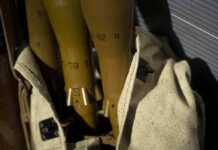
Israel intensifies airstrikes on Syria and Lebanon, targeting Hezbollah’s weapons and financial networks amid escalating regional tensions.
At a Glance
- Israeli airstrikes target Hezbollah weapons depots in Syria’s al-Qusayr region
- Attacks aim to disrupt Iran-Hezbollah supply routes and intelligence sharing
- Syrian state media reports casualties and material losses from strikes near Damascus
- Israel also targets Hezbollah-linked financial institutions in Lebanon
- Netanyahu emphasizes commitment to “cutting Hezbollah’s oxygen line from Iran via Syria”
Israel Escalates Airstrikes on Syrian Targets
The Israel Defense Forces (IDF) have launched a series of airstrikes in Syria for two consecutive days, focusing on Hezbollah weapons depots in the al-Qusayr area near the Lebanon border. These strikes are part of Israel’s ongoing efforts to disrupt the flow of weapons and intelligence between Hezbollah and Iran. The IDF confirmed targeting Hezbollah’s armament unit, which has recently expanded its activities into Syria.
Syrian state media reported that the Israeli airstrikes south of Damascus resulted in material losses and casualties, including at least two deaths and five injuries. These attacks are seen as a clear signal to Washington that Israel intends to continue its efforts to dismantle the Tehran-Damascus-Hezbollah axis, despite ongoing diplomatic dialogues with Lebanon.
7/ Lebanon: Hezbollah has conducted at least 12 attacks into Israel since CTP-ISW's last data cutoff on November 4.
Lebanese sources reported that Hezbollah fired rockets targeting IDF armor operating near al Sadana and the Shebaa Heights on November 5.
The IDF Air Force… pic.twitter.com/YVyYi5ZHpb
— Institute for the Study of War (@TheStudyofWar) November 6, 2024
Netanyahu’s Stance on Hezbollah Threat
Israeli Prime Minister Benjamin Netanyahu has emphasized the military’s commitment to disrupting Hezbollah’s supply line from Iran through Syria. In a statement highlighting the government’s resolve, Netanyahu declared their intention of “cutting Hezbollah’s oxygen line from Iran via Syria.”
Israeli government minister Gideon Saar issued a stark warning to Syria’s President Bashar al-Assad, cautioning against allowing his country to be used as a conduit for Hezbollah’s weapons supply. Saar suggested that Assad’s regime could face serious consequences if it continues to support Hezbollah, underscoring Israel’s determination to prevent the militant group’s power buildup through Syrian territory.
Targeting Hezbollah’s Financial Networks in Lebanon
Israel’s military campaign has expanded beyond Syria, with airstrikes targeting branches of al-Qard al-Hasan, a financial institution linked to Hezbollah, across Lebanon. The strikes hit over a dozen branches, following the assassination of a key Hezbollah financier. These actions aim to disrupt Hezbollah’s financial support system, complementing previous efforts targeting its leadership and communities.
Al-Qard al-Hasan, sanctioned by the U.S. Treasury since 2007 for its alleged role in Hezbollah’s financial operations, provides interest-free loans and savings accounts to many Lebanese, particularly after the country’s 2019 financial collapse. Despite the destruction of its branches, experts believe Hezbollah’s finances remain largely unaffected due to funding from Iran and global supporters.
Regional Implications and Future Outlook
The ongoing Israeli airstrikes in Syria and Lebanon highlight the persistent regional tensions and Israel’s unwavering resolve to combat what it perceives as threats to its national security. The continuation of these attacks is likely, regardless of any potential ceasefire in Lebanon, as Israel remains committed to preventing Hezbollah’s power buildup and opposing the opening of a front against it from Syrian territory.
As the situation evolves, the international community watches closely, recognizing the potential for further escalation in this volatile region. The complex interplay between Israel, Hezbollah, Syria, and Iran continues to shape the geopolitical landscape of the Middle East, with far-reaching implications for regional stability and global security concerns.
Sources:
Israeli Airstrikes Pummel Syria For A Second Day In A Row
What is the Hezbollah-linked financial institution Israel is targeting in Lebanon?












